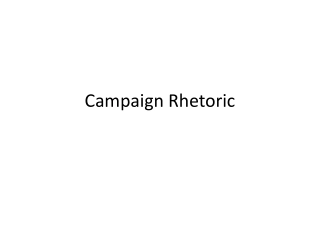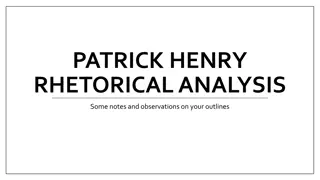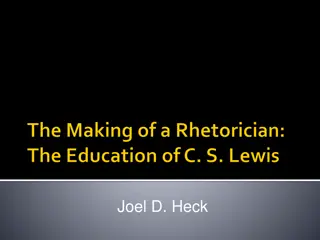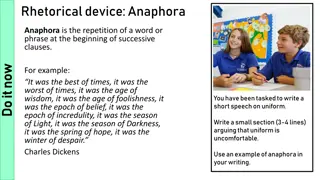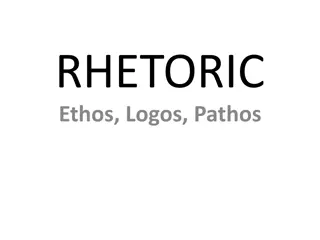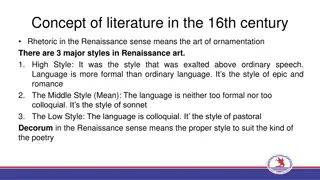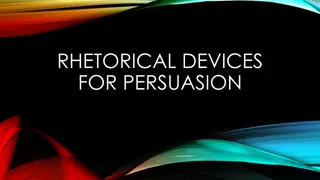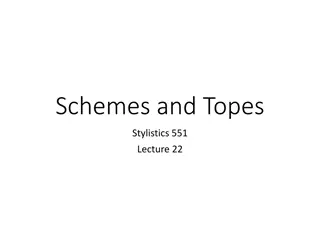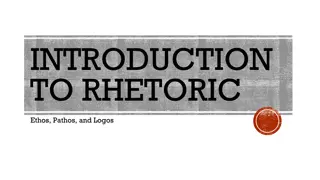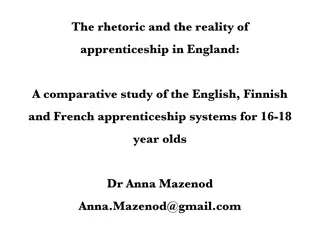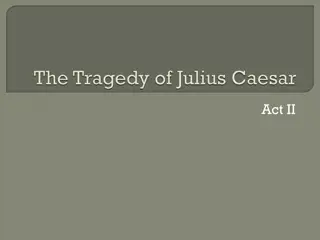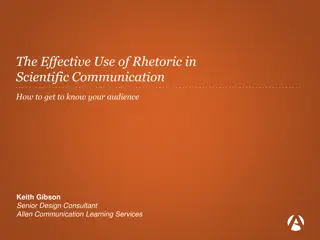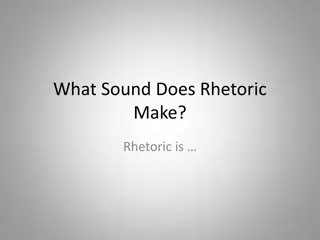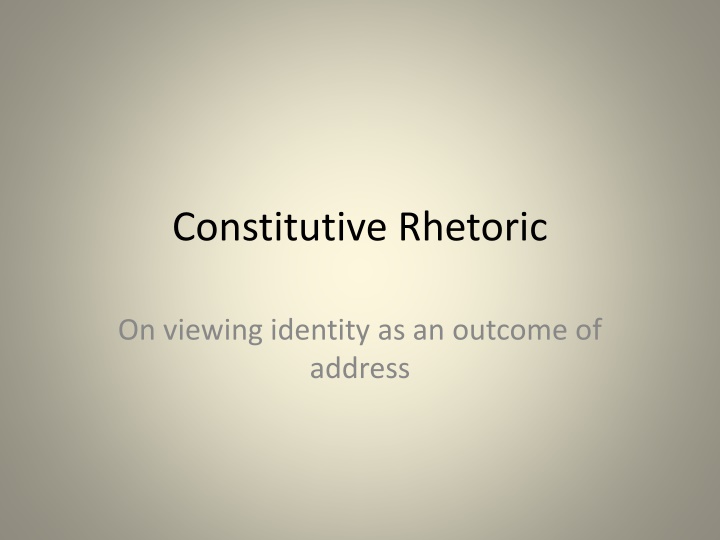
Identity Formation Through Constitutive Rhetoric
Explore how Charland's Burkean perspective emphasizes the role of identification in shaping individual and group identities through constitutive rhetoric. Dive into the spontaneous and intuitive nature of address in identity formation beyond persuasion, posing thought-provoking questions on the influence of address on self-perception and citizenship identity.
Download Presentation

Please find below an Image/Link to download the presentation.
The content on the website is provided AS IS for your information and personal use only. It may not be sold, licensed, or shared on other websites without obtaining consent from the author. If you encounter any issues during the download, it is possible that the publisher has removed the file from their server.
You are allowed to download the files provided on this website for personal or commercial use, subject to the condition that they are used lawfully. All files are the property of their respective owners.
The content on the website is provided AS IS for your information and personal use only. It may not be sold, licensed, or shared on other websites without obtaining consent from the author.
E N D
Presentation Transcript
Constitutive Rhetoric On viewing identity as an outcome of address
Charland is a Burkean He is concerned with identification, which as Burke says, must happen prior to persuasion
Charland is a Burkean He is concerned with identification, which as Burke says, must happen prior to persuasion These forms of address happen spontaneously, intuitively, even unconsciously
Charland is a Burkean He is concerned with identification, which as Burke says, must happen prior to persuasion These forms of address happen spontaneously, intuitively, even unconsciously
Charland is a Burkean He is concerned with identification, which as Burke says, must happen prior to persuasion These forms of address happen spontaneously, intuitively, even unconsciously So Charland, like Burke, wants a rhetorical theory able to account for how group and individual identities form beyond the realm of rational or even free choice, beyond the realm of persuasion
Some Grounding Questions: When have you found yourself addressed in a way that changes how you appear to yourself and others?
Some Grounding Questions: When have you found yourself addressed in a way that changes how you appear to yourself and others? Can you consider examples of how your identity as a citizen of a city, state, or nation was formed by specific kinds of address?
Some Grounding Questions: When have you found yourself addressed in a way that changes how you appear to yourself and others? Can you consider examples of how your identity as a citizen of a city, state, or nation was formed by specific kinds of address? What about your identity as a fan or follower of a specific sport, team, art form, artist, etc?
Some Grounding Questions: When have you found yourself addressed in a way that changes how you appear to yourself and others? Can you consider examples of how your identity as a citizen of a city, state, or nation was formed by specific kinds of address? What about your identity as a fan or follower of a specific sport, team, art form, artist, etc? Are even more fundamental qualities such as race, gender, sexuality, religious identity an outcome of constitutive rhetoric?
Charlands Case The constitution of the peuple Quebecois
Charlands Case The constitution of the peuple Quebecois Prior to a specific speech act in 1967, the term Quebecois simply referred a resident of the city of Quebec.
Charlands Case The constitution of the peuple Quebecois Prior to a specific speech act in 1967, the term Quebecois simply referred a resident of the city of Quebec. But, when an organization publically declared We are Quebecois that term began to name a totally different entity:
Charlands Case The constitution of the peuple Quebecois Prior to a specific speech act in 1967, the term Quebecois simply referred a resident of the city of Quebec. But, when an organization publically declared We are Quebecois that term began to name a totally different entity: The French-speaking Canadians who sought to separate from the nation.
Charlands Case The constitution of the peuple Quebecois The declaration (and the referendum that followed) helped constitute a new political identity
Charlands Case The constitution of the peuple Quebecois The declaration (and the referendum that followed) helped constitute a new political identity previously, to be a French Canadian was a cultural and linguistic but not a political status.
Charlands Case The ideological trick :
Charlands Case The ideological trick (p. 137): It seems as though the Quebecois were always already there just waiting to be named.
Charlands Case The ideological trick (p. 137): It seems as though the Quebecois were always already there just waiting to be named. But for Charland, that natural identity was in fact created in speech.
Charlands Case The ideological trick (p. 137): It seems as though the Quebecois were always already there just waiting to be named. But for Charland, that natural identity was in fact created in the address. Note, too that these constitutive narratives both create and constrain identity.
Charlands Case Constitutive rhetorics can be seductive:
Charlands Case Constitutive rhetorics can be seductive: Consider the effect of being addressed in a way that give you a new point of self- recognition
Charlands Case Constitutive rhetorics can be seductive: Consider the effect of being addressed in a way that give you a new point of self-recognition Such speeches give order to human experience and induce others to dwell in it to establish ways of living in common, in communion in which there is sanction for the story that constitutes one s life (Fisher quoted in Charland, 142).
Charlands Case Constitutive rhetorics can be seductive: Consider the effect of being addressed in a way that give you a new point of self-recognition Such speeches give order to human experience and induce others to dwell in it to establish ways of living in common, in communion in which there is sanction for the story that constitutes one s life (Fisher quoted in Charland, 142). Thus, constitutive rhetoric is akin to conversion that ultimately results in an act of recognition of the rightness of a discourse and of one s identity .
Constituting the Party The rant that started the movement

